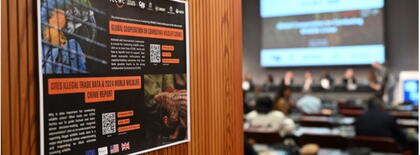The International Consortium on Combating Wildlife Crime (ICCWC) delivered a two-day cutting-edge training workshop to wildlife law enforcement officials from 21 countries in Nairobi, Kenya, from 30 to 31 October 2013. 
The training strengthened the skills of law enforcement officers from across Africa and Asia, to combat transnational organized wildlife crime more effectively through the use of a broad range of innovative and specialized investigation techniques. It further exposed these officers to hands on training on the use of tools and services available to them through ICCWC partner agencies and highlighted the importance of increased international collaboration,to facilitate multidisciplinary investigations and law enforcement responsesacross range, transit and destination States, targeting the sophisticated criminal networks behind transnational organized wildlife crime,to bring the kingpins behind these networks to justice’.
Mr John Scanlon, Secretary-General of CITES, stated that ‘the purpose of ICCWC is to bring coordinated support to national wildlife law enforcement agencies and to the sub-regional and regional networks that, on a daily basis, work to counter the illegal wildlife trade’. He further emphasized that ‘it is crucial that all available tools such as the secure communication channels and databases provided by INTERPOL and the World Customs Organization, and specialized investigation techniques, such as controlled deliveries, anti-money laundering and asset recovery tools and risk profiling, are utilized to the full extent possible, in the fight against illegal wildlife trade’.
Mr. Bonaventure Ebayi, Director of the Lusaka Agreement Task Force (LATF) said: ‘I welcome the training on intelligence gathering, management and analysis, as well as on questioning techniques, operational best practices and operational planning provided to participants. This newly acquired knowledge will empower wildlife law enforcement officers to combat the growing global challenge posed by wildlife crime more effectively’. He implored participants to among other things share knowledge and experiences during the training and to share it with their counterparts at national level as they return to their respective countries.
The workshop brought together Customs, police and wildlife law enforcement authorities from Botswana, Burundi, China, Congo Brazzaville, the Czech Republic, Ethiopia, Ghana, Indonesia, Kenya, Liberia, Malawi, Malaysia, Mozambique, Nepal, the Philippines, South Africa, Tanzania, Thailand, Uganda, Viet Nam and Zambia, as well as representatives from the Lusaka Agreement Task Force (LATF), the National Inter-Agency CITES Enforcement Coordination Group (NICECG) of China, the Association of Southeast Asian Nations Wildlife Enforcement Network (ASEAN-WEN) and the European Commission Enforcement Group.
The event was coordinated by the CITES Secretariat, in close collaboration with its ICCWC partners [INTERPOL, the United Nations Office on Drugs and Crime (UNODC), the World Bank and the World Customs Organization (WCO)] and the LATF.
The event was made possible through funds generously provided to ICCWC by the government of Sweden.



